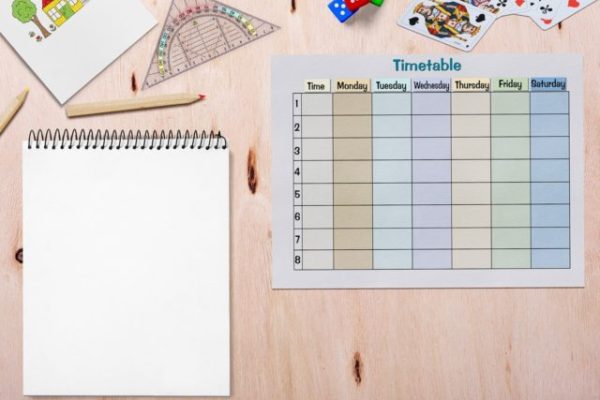After making my first specific reference to the approach of the end of last school year, and discussing the importance of knowing just how much time in class remains to you so you can make the best possible use of it and bring your final grades as close to where you want them as you can get them, I wrote my next post about looking back on your year and evaluating what you did well and what you might do better moving forward. Just as knowing your grading periods so you can keep track of the time you have to make needed improvements gives you opportunities throughout the year to check your progress, looking back on what you did well and what you found challenging at or near the end of each school year helps you know what to keep and what to change about your study skills as you finish one year and look forward to the next. Now that it has been a year since I first wrote that when evaluating your progress with your study skills, you should remember to do what works for you, take some time between now and the end of this school year to see how well you have been able to do that. Since developing your study skills takes time, I’m sure you will find that not everything went according to plan, but anything that did work for you, as well as anything that would work better if you strive to become more consistent with it, is worth continuing to do through the end of this year and into next year as well. At the same time, you may also find that some things you tried truly didn’t work, or that new methods you teachers suggested and/or required this school year are worth hanging on to. In addition to continuing to do what is still working for you from a year ago, dropping things that didn’t work or no longer work, as well as adding in new ideas that did work, are all important to consider as you continue to develop your study skills over time.
Whether you are comparing where you were a year ago to where you are now, or you are a more recent reader of my blog who is considering what works for you and what doesn’t for the first time, a good place to start is by evaluating how well you did with any study methods your teachers may have required, such as making flash cards or organizing your notebooks in a certain way. Be honest with yourself about how you handled required study methods, and try not to reject them out of hand unless you have found that other methods work better with your learning style. Required methods can seem very time-consuming and not all that helpful at first, but if you found them easier as the year wore on because you got used to them, or took my advice about using time wisely, planning ahead, and preparing for tests instead of simply studying for them, you might have found that having required materials prepared in advance had the positive effect on your test scores that your teachers were aiming for when they assigned them, and that alone might be enough for you to see the value in continuing to use them in the future. If you are still using any required methods from a year ago, either because the same teacher or a different teacher required them again or because you found that something that started out required really has been helpful once again, try to think back to where you were with it a year ago. Hopefully, you will realize that you have become more consistent and efficient with it, which will make you even more inclined to use it again next school year, whether it is required or not.
In addition to evaluating how well you did with assigned study methods, be sure to take an honest look at anything you decided to do on your own. Whether you came up with a lot of your own ideas, only a few, or have never tried to do so before, ask yourself each of the questions I posed a year ago, and consider as you do so just how helpful you have found, or could find, using your own methods to be. As great as it is to have your own ideas about study skills, putting them to good use and possibly considering using them in place of assigned methods takes commitment. As tempting as it is to do your own thing because you think it will be easier for you than an assigned method is, making sure it really works for you means being willing to treat it just as you would treat a method that was assigned to you, if your goal is to see the same results with your method as your teachers hope to have you see with theirs. If you came up with an idea that seemed to work for you, such as reading your notes aloud, covering them and trying to recite them, using a whiteboard for extra practice, or getting someone to quiz you, did you do it consistently? Did you do it more than once, for several days, or for a week or more before a test, or did you only do it the night before or morning of a test? Did you focus more of your time and effort on your preferred subjects and less on the more challenging ones? Did you let the methods you came up with yourself take too much time away from required ones instead of trying to balance them, thereby adversely affecting your overall grades even though your test grades were decent? When you consider which methods to keep and which methods to change, remember that it is often a combination of methods that works best, and that unless they impact your learning style enough to make it worth talking to your teachers and asking permission to do things differently, required methods exist for a reason. Try not to get too excited to see a required method go away at the end of the year – instead, be prepared in case it is required again, and try to start the new year making the best of it instead of complaining. Sometimes, it takes more than one school year for a good study method to truly stick, whether it is a required method or not, and unless a method has a decidedly negative impact on your grades, it is better to err on the side of planning to keep it than planning to get rid of it. The more you have in your bag of tricks, the more you have to draw on, and the more you have to draw on, the more able you will be to build your study skills and prepare for increased expectations in the future.
In addition to evaluating study methods, take a look too at how you handled assignments, both daily homework and long-term projects. Just as with your use of different study methods, with assignments, too, it is worth asking again all the questions I posed a year ago, to see how much progress you have made, as well as to remind yourself of where improvements still need to be made. Whether you considered these questions a year ago, or are about to do so for the first time, bear in mind that they are questions you should ask yourself year over year, so that you can consistently evaluate where you are on your study skills journey and strive to make improvements, not only this year or next year, but throughout your academic career. How consistent were you with writing assignments down yourself this school year, instead of relying solely on your school’s online portal? Did you only use the online calendar, or did you also make your own, so you could add things to it to better plan your time, while removing things that did not apply to you? How well did you manage your time each night, make time to work on weekends, and generally avoid procrastinating? If you think you will need to be better about any of these things at the beginning of next year, start now, and write down anything you did that allowed you to see improvement, no matter how small. Make sure to keep whatever plans you make, whether you write them, type them, or do both, where you will be able to find them when the new year starts. The same goes for study methods, and assignments on which you applied them. Instead of just tossing every paper and emptying every online folder, keep a copy of anything that might be useful to you next year, as an example of something that worked that you might wish to use again, and/or as a review of content that might help you when you are faced with more advanced content next year. When I say you might wish to use something again, make sure you understand that I do NOT mean you should turn in the same assignment, or anything close to it. What I mean instead is that you might wish to keep a writing assignment that can help you with paragraph structure, or a research paper that can help you with citing your sources properly, or a math assignment or test on which you showed your work well enough that it can help you review the concept and/or offer you a guide for showing your work on the more difficult problems you will soon face. Try to find the right balance between throwing out or deleting everything just because you can and keeping everything because you think you should, and only keep what you truly believe can help you build both academic and study skills progress in the new year. In addition to keeping whatever you believe might be relevant from this school year, look back at what you kept from last year. If you find you kept things that were not useful this year, or that you can replace something from last year with something from this year, you will be able to better organize what you do keep, which will make you more likely to use it next year.
As the end of the school year approaches, it is a good time to look back at all you’ve accomplished, so you can figure out what you did well and what you still wish to do better, both through the remainder of this school year and in preparation for the new school year to come. Figuring out what worked for you, with required and/or chosen study methods, as well as with both daily assignments and long-term projects, and evaluating what to keep and what to change moving forward, is a great way to ensure that you will continue to make progress on your study skills journey, both now and in the future.

